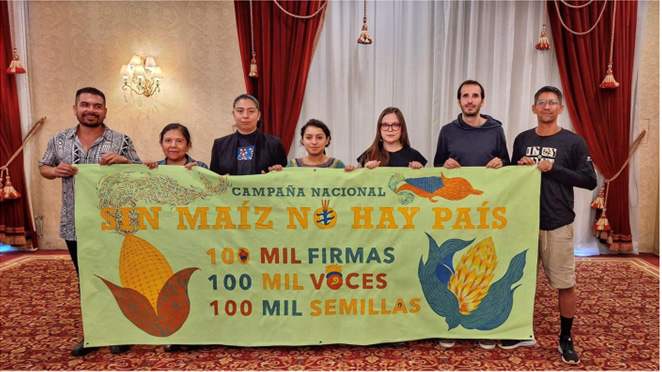U.S. flails in GM corn dispute with Mexico

Published: October 11, 2024
Category: Mexico’s GMO Ban
By Timothy A. Wise
Closing arguments are in in the U.S. trade complaint against Mexico’s restrictions on genetically modified (GM) corn, with the three-arbitrator tribunal set to rule on the matter in November. The legitimacy of the trade agreement itself hangs in the balance.
In the course of the year-long process Mexico has dismantled U.S. claims, showing that its precautionary measures are permitted under the terms of the trade agreement, that its restrictions barely impact U.S. exports, and that it has a mountain of scientific evidence of risk to justify its precautionary policies.
Will the panel let the U.S. use a trade agreement to stop a policy that barely affects trade?
The U.S. government requested this formal dispute-resolution process a year ago under the U.S.-Mexico-Canada trade agreement (USMCA) over Mexico’s February 2023 presidential decree that restricted the use of GM corn in tortillas and phased out the use of the herbicide glyphosate, which is applied to 80% of U.S. corn. Mexico cited evidence of both GM corn and glyphosate in tortillas and other common corn preparations and documented the risks from such exposures, particularly for a Mexican population that eats more than ten times the amount of corn consumed per capita in the United States.
Where is the trade restriction?
The U.S. claim has been specious from the start. In its complaint it mischaracterized Mexico’s presidential decree as a “Tortilla Corn Ban” and a “Substitution Instruction” to phase out imports of GM yellow corn for animal feed. Mexico, in its written filings in the case, has repeatedly objected to these terms.
By calling it a “tortilla corn ban” the U.S. is implying that Mexico has banned U.S. exports of white corn, the kind commonly used in tortillas. They haven’t. They only banned the use of GM corn in tortillas and in other foods made from minimally processed (ground) white corn. It is a ban on use, not imports. White corn exports, including GM white corn, still flow from the U.S. to Mexico. They just can’t be used in the tortilla/corn-flour food chain.
Because the vast majority of U.S. corn exports are yellow varieties for animal feed and industrial uses, the restriction barely affects U.S. corn producers. Where is the trade restriction?
Much of the U.S. case rests on its misleading characterization of the “Substitution Instruction” as a trade restriction. It is no such thing.
The U.S. argues that the 2023 decree mandates the eventual phase-out of all GM corn imports, threatening the $5 billion-per-year Mexican market for U.S. yellow corn – 97% of U.S. exports – overwhelmingly GM varieties mainly used as animal feed. Even though Mexico has no current restrictions on such U.S. exports, and none are planned, the U.S. argues that Mexico’s mandate threatens future profits it expected to receive from the trade agreement.
Trade lawyer Ernesto Hernández López took on the U.S. deception, pointing out that there is no mandate (instruction) to stop using GM corn, just to grow more alternative non-GM feed sources and use them as they become available. The original decree uses the term “gradual substitution” (sustitución paulatina) and makes clear that it is based on supplies being available.
As Hernández López points out, the trade panel should not accept a U.S. argument based overwhelmingly on hypothetical future reductions in Mexican imports of GM feed corn. The U.S. case is made all the weaker by data showing that U.S. feed-corn exports to Mexico have gone up significantly since the 2023 decree, a result of weak harvests due to drought.
Consider the facts
The USMCA tribunal should consider the facts:
- Mexico’s GM corn policies have barely impacted U.S. exporters. Yellow corn exports are booming and the border is wide open to white-corn exporters, even for tortillas if U.S. farmers switch to non-GM varieties.
- The USMCA agreement allows for such precautionary policies and even grants special exceptions for policies that support indigenous cultural practices. Mexican courts have repeatedly ruled that Mexicans have a constitutional right to protection of their heritage corn.
- The Mexican government and expert scientists in the case have presented reams of peer-reviewed science documenting the risks to Mexicans from GM corn with glyphosate residues, evidence the U.S. government has largely ignored in its formal rebuttals in the case.
- The U.S. is left with the weak argument that Mexico’s restrictions are a Sanitary and Phyto-Sanitary (SPS) health measure and require a strict risk assessment in advance of enacting the policy. Mexico argues that the policy is more than a health measure because it also protects the environment and indigenous rights. So no such risk assessment is required. Still, Mexico has produced plenty of science to show risk.
The Mexican government has also highlighted how lax and riddled with conflicts of interest the U.S. regulatory process is for GM corn, a charge backed by the U.S. Center for Food Safety. This means that, as a Reuters headline put it in March, “Mexico waiting on US proof that GM corn safe for its people.”
After hundreds of pages of filings and two days of hearings, Mexico is still waiting for that proof. Hopefully the tribunal will weigh the facts, dismiss the U.S. claim, and not allow the U.S. to misuse a trade agreement to stop a policy it doesn’t like.
Follow the US-Mexico GM corn dispute, and get background, on IATP’s resource page, Food Sovereignty, Trade, and Mexico’s GM Corn Policies.
Source: InterPress Service
To view source article, visit: https://www.ipsnews.net/2024/08/us-flails-gm-corn-dispute-mexico/
Organic & Non-GMO Insights October 2024




